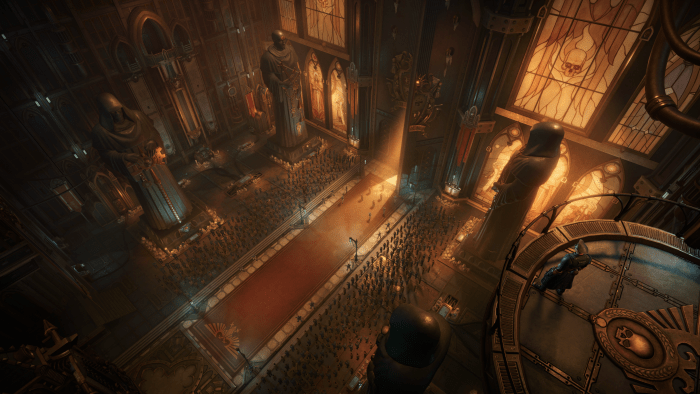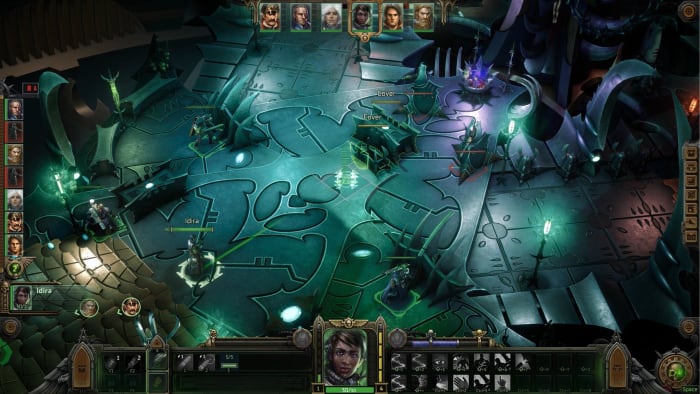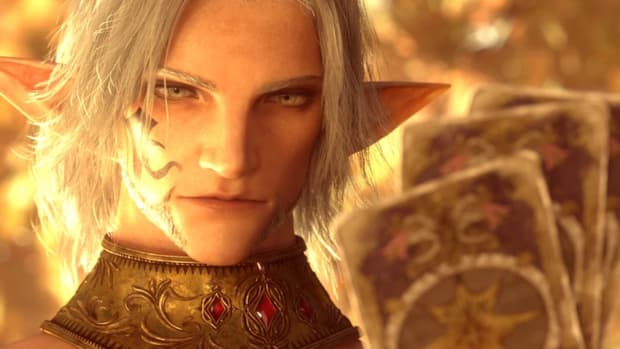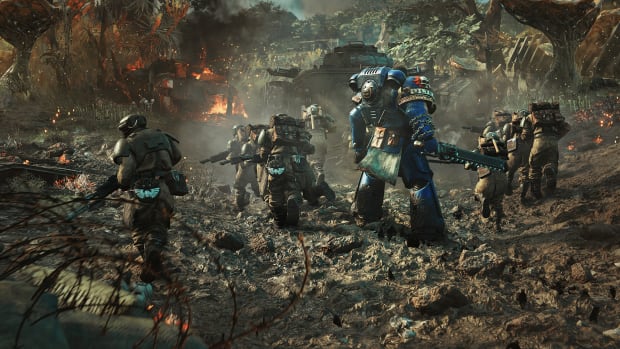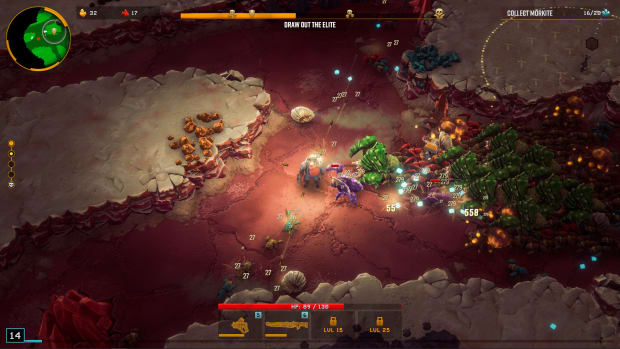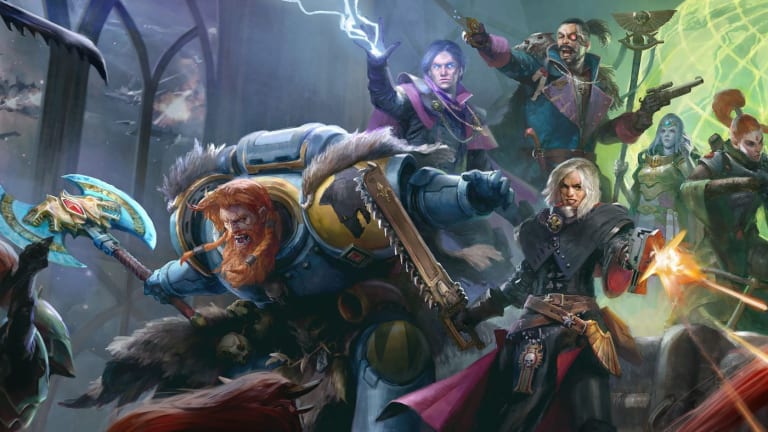
Warhammer 40,000: Rogue Trader – the God Emperor smiles at this CRPG

Rogue Trader is both a quintessential Warhammer 40,000 game and manages to be different from the rest at the same time. It immerses the player into the setting like few others can, and yet it shows a side we so rarely see in a franchise that’s so dominated by Space Marines you’d think it has nothing else to offer. Don’t get me wrong, Space Marines are badass – but despite being rare in the setting, the Warhammer 40,000 video games make them seem omnipresent. It’s refreshing to get a game in which you don’t even hear about them for a good while. That makes it all the more impactful when the lone Space Marine of the story does finally show up.
If you’ve played one of Owlcat’s previous games, like their excellent RPGs using the Pathfinder tabletop RPG ruleset, then you already know what to expect from Warhammer 40,000: Rogue Trader – another incredibly deep, rich, and epic (in every sense of the word) CRPG, which is also based on a tabletop ruleset, namely Fantasy Flight Games’ title of the same name.
Rogue Traders are an interesting group of people inside the Imperium of Mankind, Warhammer 40,000’s theocratic-fascist human empire on which most of the franchise’s games are centered – because, well, the alternatives are all worse. It’s not called a grimdark setting for no reason.
Whereas everything in the Imperium follows a strict hierarchy, Rogue Traders are a bit of an exception, for they possess something called a Writ of Trade – a giant document (we’re talking several meters long, because why not) kept inside a safe that looks like a mixture of a church and a throne room due to its great importance.
A Writ of Trade is a commission from the God Emperor himself, granting the Rogue Trader immense privileges that empower them to explore distant star systems, take possession of them, and exploit them for the good of the Imperium. Whereas anyone else would be shot for doing anything other than firing at aliens – or Xenos, as the Imperium calls them –, Rogue Traders can act as diplomats and merchants.
Essentially, a Rogue Trader has the power to carve out their own personal empire from newly-explored areas of space that become their private property and not even the imperial establishment can order them around to great effect. It’s probably the most freedom anyone could ever get in the Imperium.
All of this is explained early on in the game as well, so you really don’t need to be an expert on Warhammer 40,000 to start your journey – but knowing your way around common terms and concepts of the universe certainly makes everything a little smoother and more enjoyable.
Owlcat put a lot of love into Rogue Trader’s atmosphere – the score mixes choral singing and organs with military bombast, which seamlessly connects the game to others set in this universe. The environments are all on point as well, from distant worlds to the Rogue Trader’s majestic Void Ship that looks like a floating Gothic cathedral inside and out, to the iconic weaponry that’s available to the companions and Xenos you meet, Rogue Trader oozes detailed Warhammer 40,000 passion.






It makes you feel like a powerful Lord Captain with a special destiny and lets you forget you’ve ever been anything other than that.
I want to avoid mentioning spoilers as much as possible, but fans of the setting will be overjoyed to hear that they’ll be allowed to actually set foot on Commorragh, the Dark City. It’s the first ever portrayal of the Dark Eldar’s home on screen and it does not disappoint. That’s also where you can use Ulfar, the game’s lone Space Marine, in battle. Where regular characters take up one square on Rogue Trader’s tactical combat grid, this Space Wolf takes up four, giving a great impression of a Space Marine’s bulkiness.
Fights are turn-based as you’d expect, complete with all the neat features of a tactical combat game: chance to hit is clearly displayed above the heads of enemies and smoothly adapts as you try out different positions from which to shoot before committing to an action; you can see the range and area-of-effect of your abilities, movement ranges, turn order, and any positive or negative effects affecting characters; there is a cover system; and movement and action points are split up, though you’re usually restricted to one attack per turn. As you can imagine, that’s quickly thrown out of the window once you get access to more abilities as you level up your characters.




Battles are challenging. Friendlies are not safe from your own attacks and projectiles can even penetrate targets to deal damage to additional beings behind them. Everything in the game is governed by dice rolls, faithful to the tabletop system, so you can always trust in your luck – or curse your lack of it – when things get heated. And they will, because you’re often confronted with overwhelming forces, the overcoming of which makes you feel suitably heroic and superior. The game’s Momentum system gives you access to special ultimate abilities depending on whether you’re dominating the current encounter or if it’s a desperate struggle, which further reinforces the epicness.
Space combat is also a thing, though it’s much less detailed and more of a minigame in which you have to manage the abilities of your six officers to fend off pirates or bloodthirsty Aeldari. As you travel the Koronus Expanse and discover worlds, you can also colonize them, which allows you to access more resources and additional quests – both of these features are still being expanded, so the early access won’t show their final state by any means.
The same goes for character creation, where a lot of holes are still visible in terms of options. Owlcat has concentrated on getting the main content in place – the 60 to 80 hours of story and combat you can already explore in the early access version.

Character creation is incomplete as yet, but already quite deep. You can also import your own character portrait, which is neat.
Owlcat
While there is plenty of action in Rogue Trader, Owlcat has not ignored the role-playing side of things. There is a ton of dialog in the game you need to read through and, as usual, plenty of optional skill checks and decisions with all sorts of consequences as you navigate through your new role as Lord Captain and decide which kind of Rogue Trader you want to become. The more resources you amass, the more enemies you make, but the more options become available to deal with situations as well. The life of a Rogue Trader is full of intrigue and betrayal, politicking and negotiating.
Warhammer 40,000: Rogue Trader is already an epic CRPG and among the best Warhammer 40,000 games ever made – and it’s far from finished. Anyone who has pre-ordered the title will have access to the beta version releasing on June 1, 2023, and can check on the progress for themselves.

